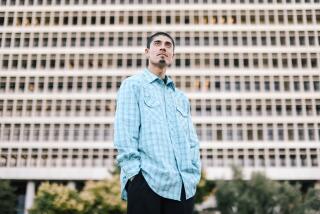‘60s Black Activist Sought After Attack on 2 Deputies
- Share via
ATLANTA — Police on Friday launched an intensive manhunt for the fiery black activist known in the 1960s as H. Rap Brown, after he allegedly killed one sheriff’s deputy and wounded another as they tried to arrest him.
Atlanta police said that Jamil Abdullah Al-Amin, as the former Black Panther now is called, also might have been wounded in the shootout Thursday night near a community grocery store that he runs in this city’s West End.
Police said they followed a trail of blood into a vacant house near the shooting scene but found no one. Officials speculated that a second gunman may have been involved, since investigators found three types of shell casings.
Al-Amin, 56, reportedly was seen fleeing the scene in a black Mercedes-Benz.
As Brown, Al-Amin was a familiar figure in the late ‘60s. Tall, thin and bespectacled, he was a passionate orator who served as a leader of the Student Non-Violent Coordinating Committee and as justice minister for the militant Black Panthers.
During a speech in July 1967, he called on blacks to arm themselves, saying: “Violence is as American as cherry pie.” That aphorism became so well known--and so characteristic of those turbulent times--that it is included in Bartlett’s Familiar Quotations. It is the only entry under Rap (Hubert Gerold) Brown.
On Friday, Al-Amin was charged with two counts of aggravated battery on a police officer. One of those charges was expected to be upgraded to murder after the death of 35-year-old Fulton County Sheriff’s Deputy Ricky Kinchen. The FBI also issued an arrest warrant charging Al-Amin with unlawful flight. “All indications are that he has fled Georgia,” bureau spokeswoman Celeste Armstead said.
Kinchen was pronounced dead at Grady Memorial Hospital 17 hours after suffering wounds to the abdomen and hand with what police described as a high-powered assault rifle. He was a nine-year veteran of the department.
The second deputy, Aldranon English, 28, remained hospitalized in stable condition with bullet wounds to his chest, legs and arm.
Both officers were wearing protective vests--along with metal chest plates called ballistic shields--when they tried to arrest Al-Amin on a warrant for failing to appear in court to face charges of receiving stolen property, impersonating an officer and having no proof of insurance.
According to court documents, the charges stemmed from an incident last May in which Al-Amin allegedly flashed a phony police badge after officers pulled him over in a traffic stop.
Authorities said that when the deputies found no one at Al-Amin’s store Thursday night, they drove around the block and spotted a man in a parked car.
After ordering the man out of the car, “the deputies then asked him to show his hands,” said Atlanta Police Chief Beverly Harvard. “He responded by saying, ‘OK, here they are.’ At that point in time, the two deputies were fired upon.”
At a news conference Friday, Harvard also said that English “positively identified [Al-Amin] as the person who fired upon the two deputies.” He also told investigators that he watched Al-Amin fire several shots at Kinchen.
Harvard said that police had recovered dozens of spent shell casings from the scene, including 20 rounds from a .223-caliber assault rifle, four rounds from a 9-millimeter handgun and 11 .40-caliber rounds. Some of those rounds had been fired by the officers. “We don’t know if there was one weapon or multiple weapons involved,” the chief said.
The two deputies were not aware of Al-Amin’s former identity when they showed up at the Community Store on Oak Street to serve the warrant, officials said.
“I think both officers kind of walked into this,” said Fulton County Sheriff Jacquelyn Barrett. “A lot of the time we are flying absolutely blind. We have warrants for people we don’t have photographs of.”
In 1967, Al-Amin was charged with inciting a riot in Cambridge, Md., after he told a crowd of some 400 people: “It’s time for Cambridge to explode, baby. Black folks built America, and if America don’t come around, we’re going to burn America down.”
After that rally, shots were fired. Al-Amin was wounded in the forehead by a shotgun pellet, while a police officer was shot in the neck, face and hand. No one was killed.
Al-Amin moved to Atlanta in 1976 after converting to Islam during the five years he spent in prison for taking part in a robbery that ended in a shootout with New York police.
In 1995, he was accused of aggravated assault, carrying a concealed weapon and possessing an unlicensed pistol after a man said that Al-Amin had shot him. His accuser later recanted.
The former Black Panther was well known on this city’s west side, both as a spiritual leader at the Community Mosque and as a neighborhood activist working to rid the area of drug dealers and prostitutes.
The section of Atlanta known as West End is a neighborhood of older single-family homes about six miles from downtown. On the streets near the Community Mosque, many residents wear the full-length garb of the Islamic faith. Arabic script is found over some doorways.
On Friday, as news media converged in front of the Community Store, several Muslims gathered for services inside the mosque across the street--called to worship by recorded chants heard through speakers on the roof of the lime-green house. The pungent smell of incense hung in the air.
The store was closed and padlocked, the windows covered with protective wire mesh. Around the corner sat an aging Oldsmobile Delta 88, marked by bullet holes. Across the street from the store, several children played basketball in a park.
Following the service, one of three robed men who emerged from the mosque read a statement in which he praised Al-Amin as “a respected leader in the Islamic community [whose] works are well documented not only in Atlanta but throughout the Islamic world.”
“The only people aware of what happened last night are the victims and the perpetrator or perpetrators,” Nadim Ali said. “We ask you to avoid passing judgment until all the facts are in.”
*
Stanley reported from Atlanta and Clary from Miami.
More to Read
Sign up for Essential California
The most important California stories and recommendations in your inbox every morning.
You may occasionally receive promotional content from the Los Angeles Times.













